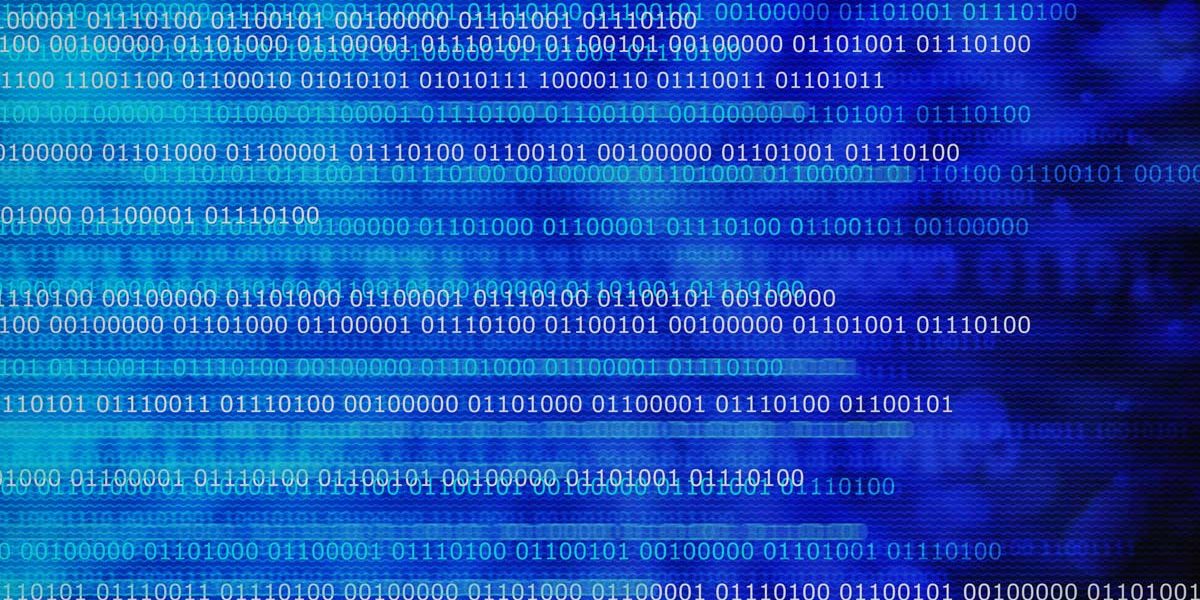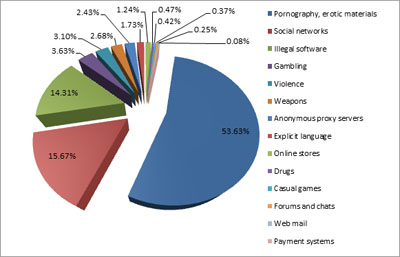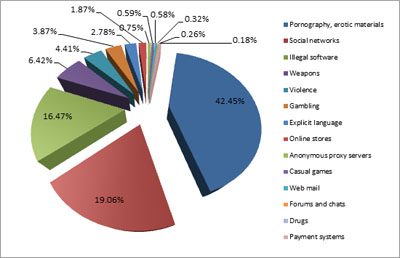
The Parental Control component in our products has already been described in detail. The component’s main task is to help parents safeguard their children from the hidden dangers of uncontrolled use of computers and the Internet. By default the component is not enabled – it has to be activated by the parents themselves.
Parental Control puts parents in charge of all their children’s online activities. This includes scheduling the days and hours the computer can be used and the Internet accessed, restricting how your child can communicate in chat rooms and social networks as well as saving any correspondence, and, importantly, blocking access to websites with harmful or undesirable content.
There are 14 such categories of sites in Kaspersky Lab products. Parents can decide which type of sites their child will not be able to access. When Parental Control is activated, access to the following categories of websites is blocked automatically:
- Pornography, erotic materials
- Illegal software
- Drugs
- Violence
- Explicit language
- Weapons
- Gambling
- Anonymous proxy servers
Any of the above categories can be unblocked if necessary, while the following categories can also be added to the list:
- Forums and chats
- Web mail
- Online stores
- Social networks
- Payment systems
- Casual games
Kaspersky Security Network (KSN) helps us gather statistics from users of Kaspersky Lab products, including alerts triggered by the Parental Control component.
Breakdown of alerts triggered by the Parental Control component worldwide, March-August 2012
It should be noted that the breakdown depends not only on the number of attempts to access websites from a category blocked by Parental Control but also on the specific categories that have been flagged by parents.
The Top 10 includes those categories of sites that are flagged automatically when the Parental Control component is activated, plus two of the categories that have to be activated by parents – ‘Social networks’ and ‘Online shopping’. Three categories lead the others by a wide margin, with ‘Pornography, erotic materials’ way out in front. Every month KSN registers 60 million attempts to access sites from this category on computers where this category was flagged in Kaspersky Lab’s Parental Control component. ‘Social networks’ is in second place with 16 million alerts per month, followed closely by ‘Illegal software’ (14.3 million alerts per month).
Does the breakdown of Parental Control alerts differ from country to country? To find out, we compared the alerts triggered by the component in countries from different parts of the world, namely Russia, Germany, the UK, the US, Japan, Brazil and Saudi Arabia.
Russia
In Russia the top three categories match the worldwide figures. Illegal software, traditionally popular in the country, accounts for slightly more alerts than the global average – 16.47% compared to 14.31%. The only country in our analysis where that category scored higher was in Saudi Arabia.
Breakdown of alerts triggered by the Parental Control component in Russia, March-August 2012
One worrying statistic was the ‘Weapons’ category coming fourth with a percentage of 6.42%.
Germany
Germany was the absolute leader in the ‘Pornography, erotic materials’ category: 80% of all alerts in the country were triggered by this category, which significantly exceeded the world average of 53.6%. In absolute numbers, that translates to 5.3 million alerts per month.
Breakdown of alerts triggered by the Parental Control component in Germany, March-August 2012
However, the data should not be taken at face value – it’s possible that many parents in Germany only activate this category in the Parental Control component, leaving websites in all other categories freely accessible to their children.
United Kingdom
In the UK the ‘Anonymous proxy servers’ category came third in the rating with 9.93%, while ‘Illegal software’ in fourth place accounted for 6.3% of all Parental Control alerts. It appears that children and teenagers in the UK take a keen interest in software and are familiar with the methods for bypassing web filters and the use of anonymizers.
Breakdown of alerts triggered by the Parental Control component in the UK, March-August 2012
Another distinct feature of the UK rating was the relatively high percentage for the ‘Gambling’ category (5.68%).
United States
In the US, the ‘Anonymous proxy server’ category also came third in the rating with 8.98% of alerts – slightly less than in the UK.
Breakdown of alerts triggered by the Parental Control component in the US, March-August 2012
The percentage of the ‘Violence’ category is relatively high in the US – it occupies fourth place in that country’s rating with 7.32% of alerts, which is more than in the other countries we analyzed. It is followed by the ‘Gambling’ category, which at 5.77% is also higher than in the other countries.
Japan
The ‘Pornography, erotic materials’ category in Japan was 12.12 percentage points higher than the average figure globally. The ‘Illegal software’ category also scored highly in Japan (11.83%). This is somewhat surprising because, as a rule, these types of programs are more popular in developing countries. At the same time, youngsters in technologically advanced Japan showed little interest in anonymous proxy servers.
Breakdown of alerts triggered by the Parental Control component in Japan, March-August 2012
Trailing some way behind in fourth and fifth places are the ‘Violence’ and ‘Weapons’ categories, with 3.16% and 2.48% respectively.
Brazil
In Brazil, the ‘Social networks’ category led the way with 57.84% – twice as much as the ‘Pornography, erotic materials’ category. This breakdown of Parental Control alerts differs significantly from that of the world average.
Breakdown of alerts triggered by the Parental Control component in Brazil, March-August 2012
Brazilian children also showed that they are tech savvy – the ‘Anonymous proxy server’ category ranked fourth in the rating (2%).
Saudi Arabia
Saudi Arabia was well ahead of all the countries analyzed when it came to the ‘Illegal software’ category. It accounted for almost half of all Parental Control alerts. That is compared to a world average of just 14.3%.
Breakdown of alerts triggered by the Parental Control component in Saudi Arabia, March-August 2012
A relatively low percentage of alerts in the ‘Pornography, erotic materials’ category in Saudi Arabia (30.88%) is most probably down to the country’s cultural norms and values: in the majority of Middle East countries both society and the state strongly disapprove of pornography and erotica. The ‘Gambling’ category came fourth with 4.61% of alerts.
Comparison between countries
To get a clearer overall picture, we compared all the leading categories that triggered Parental Control alerts in the countries analyzed:
Although the ‘Pornography, erotic materials’ category was the runaway leader in the US and the UK, the distribution of Parental Control alerts for the other categories was more even than in the other countries. This indicates that, on average, parents in the US and the UK activate more categories of the Parental Control component than parents in other countries.
In summing up, we would like to draw parents’ attention to two categories of sites.
As has been already said, the ‘Social networking’ category is disabled by default in the Parental Control component. However, we strongly recommend that parents turn it on and use appropriate controls based on the age and maturity of their child. Social networks create opportunities for young people to communicate with friends and explore their creativity but with these opportunities come risks. Children may be targeted by cybercriminals, whose scams can dupe adults, not to mention young, inexperienced users. This could be through the use of malicious links and links to fraudulent sites. Social networks are also a place where your child can come into contact with unpleasant or even dangerous people. The fact that the ‘Social networks’ category came second globally in terms of Parental Control component alerts demonstrates that children are desperate to get on to social networking sites. Fortunately, the fact that this category came second also shows that many parents understand the dangers posed by social networking sites and have included this category in the list of content to be blocked by the Parental Control component.
The other category of websites that we want to bring to the attention of parents is that of ‘Anonymous proxy servers’. It might not be obvious why this category is filtered on default. Basically, these sites help children bypass parental control restrictions. Anonymous proxy servers are web pages where users can enter the name of the site they want to access. The proxy server then loads the contents of the required site. An application that blocks access to pornographic sites, for instance, may not be able to identify the site the content is loaded from. That is why our products enable the ‘Anonymous proxy servers’ category by default.
As the statistics for the Parental Control component in Kaspersky Lab products show, children are just as curious the world over, though each country has its own peculiarities. And, of course, it is the duty of parents to take care of their children at all times, no matter where they are.
Statistics on Parental Control Alerts for Various Countries
































Viktoria
Oh my! Now I’m using PCWebControl software to help my kids but I have to keep my eyes open all the time! Even if that parental control will protect my boys from the dark side of the internet they could receive an spam e-mails with unsuitable contents! What can I do now?